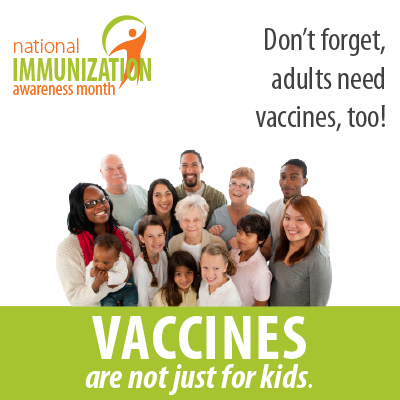By Allison Hackbarth, JSI Research & Training Institute, Inc. – Project Manager, Massachusetts Adult Immunization Coalition
Did you know that August is National Immunization Awareness Month? Now is the perfect time to get the word out about the importance of vaccinations for adults. National Immunization Awareness Month, held each August, provides an opportunity to highlight the value of immunization across the lifespan.
 Immunizations are one of the most effective public health interventions because they reduce or eliminate the burden of diseases such as pneumonia, flu and shingles. The Centers for Disease Control and Prevention (CDC) recommends vaccinations from birth through adulthood to provide a lifetime of immunity. While childhood vaccination rates are relatively high, most adults are not vaccinated as recommended, leaving them vulnerable to illness, long-term suffering, and even death.
Immunizations are one of the most effective public health interventions because they reduce or eliminate the burden of diseases such as pneumonia, flu and shingles. The Centers for Disease Control and Prevention (CDC) recommends vaccinations from birth through adulthood to provide a lifetime of immunity. While childhood vaccination rates are relatively high, most adults are not vaccinated as recommended, leaving them vulnerable to illness, long-term suffering, and even death.
According to the Massachusetts Healthy Aging Data Report, the state average for persons age 60 or older who get annual flu shots is about 68 percent, while the state averages for the pneumonia and shingles vaccines in this age group are even lower, at 61 percent and 15 percent respectively. In some towns like Springfield, only five percent of older adults are getting the shingles vaccine.
Immunization is especially important for adults 60 years of age and older, and for those who have a chronic condition such as asthma, COPD, diabetes or heart disease. “It takes a collaborative effort to ensure adults know about the importance of vaccination, have access to immunizations and are reimbursed adequately,” said Antonia Blinn, Massachusetts League of Community Health Centers. “That’s why we seek to share innovative strategies as well as evidence-based approaches to improving adult vaccination rates.”
Why are adults not being vaccinated as recommended?
- Lack of awareness and knowledge among adults of the need for vaccines. Many are also misinformed about the safety and effectiveness of vaccines.
- Limited access: A large number of adults do not have regular physical exams and switch doctors and health plans often. More and more pharmacies are offering vaccines making access easier.
- Lack of resources and knowledge among healthcare providers to maintain an adequate supply of vaccines or to keep up with vaccine guidelines. This is important because healthcare providers influence their patients’ receptiveness to vaccine.
- Limited financing for immunizations: The Affordable Care Act is making financing less and less of an issue with its requirement on coverage of preventive care, including vaccination with no co-pays or cost sharing. Insurance though does not always pay for adult vaccines administered outside of the traditional medical setting. For people without health insurance, out of pocket costs for vaccines can be prohibitive.
What are the vaccines that adults need?
The specific vaccines you need as an adult are determined by factors such as your age, lifestyle, high-risk medical conditions, occupation, location of travel, and previous vaccines. Throughout the adult life, vaccines are needed to protect against: seasonal flu (for all adults); tetanus, diphtheria and pertussis or whooping cough (for all adults); shingles (for adults 60 years and older); pneumonia (for adults 65 years and older and adults with specific health conditions). There are other vaccines that adults may need too. CDC has a webpage on adult vaccinations including an adult vaccination quiz to determine which vaccines are needed.
Do you know about the Massachusetts Adult Immunization Coalition?
The Massachusetts Adult Immunization Coalition (MAIC) is a collaborative partnership dedicated to increasing adult immunization through education, networking, and sharing innovative and best practices. There are currently over 200 members representing local and state public health organizations, community health centers, medical practices, health insurance plans, pharmacies, senior service organizations, hospitals, home health, and more. “With so many competing priorities, it is more important than ever to collaborate and identify unified strategies to ensure that adults have equal access to immunizations and that providers are reimbursed adequately” said Antonia Blinn, co-facilitator. “We welcome all new members.”
For more information or to join, visit the MAIC website.
How can I or my organization help promote adult vaccinations during August?
Activities focus on encouraging all people to protect their health by being immunized against infectious diseases. A National Immunization Awareness Month Communication Toolkit is available – download the toolkit . The toolkit is structured to highlight the importance of immunizations for a different population each week of the month.
The toolkit contains everything you need to promote the message of vaccination – key messages, sample media materials, social media content, sample articles and event ideas. You can also get eye-catching logos and banners for each weekly theme to place on your websites and social media platforms. Create buzz by using the social media messages in the tool kit. The messages are crafted in a way that you can use them as they are—or tailor as you see fit for your audience(s).
